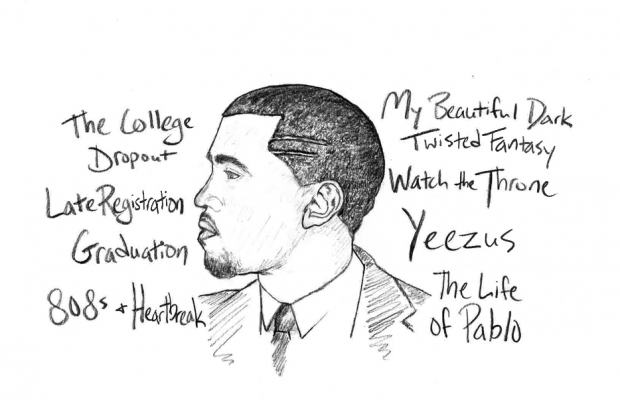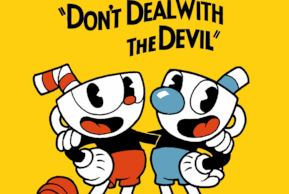Headed West: Legacy of Kanye West fueled by his pursuit of impacting human history as an artist

By: Ben Louviere
“World History: Turning of the Millennia Vol.2” — maybe, 1000 years from now, this will be the title of a history textbook studied in class at the prestigious Cedar Falls High School Of The Distant Future. This is, of course, assuming we make it that far (because over the past 100 years, we humans haven’t really been set on a course for long term sustenance. Yet, I digress). Let’s say that students are reviewing their textbook for a unit covering the years 2000 to 2030. This important unit, inevitably, describes the revolutionary birth and first baby steps of humanity’s information age. It has become obvious: Kanye West wants a paragraph.
Over the past decade, hip-hop music has dominated the mainstream, and it is showing no signs of slowing down. This will in fact tie in nicely with the rest of the unit in the textbook. For, you see, arts are, inherently, expressions of the times. This is why we care about the works of those like Dante Alighieri, Giotto, Leonardo da Vinci, William Shakespeare, Vincent van Gogh and Pablo Picasso. These people were all, quite simply, unlike everyone else — great artists of their societies, who rose above all others through their works. Their circumstances, their ideas, and their feeling of purpose compelled them to create a legacy which would impact human history.
History in America, however, is dominated by the culture of white people and their European ancestors. In America there is “history” and there is “black history.” Black history has been relegated to this niche because it is entirely different than mainstream European American history. However, the mainstream has changed.
African-Americans, whose humanity was burglarized as they were stolen from a continent to be used as slaves in the most disgustingly inhumane business practice in the history of human greed — this is where black history in America begins. To condense the story from then until now: black people in America have fought and died for generations in a struggle for humanity that a white-controlled society reserves primarily for itself. This fight is, quite obviously, still being valiantly fought today. Black music has evolved, parallel to this context.
What started with field songs and gospel music led to the rise of blues, soul and jazz, then evolved into funk, R&B and currently, primarily, hip-hop.
This is not just the history of music. This is the history of expression, inspired by the events and big ideas of the times. In our textbook, the chapter will focus on racial tensions of today as a result of the ongoing black civil rights efforts. It will mention the point at which black culture — black history — crossed over to the mainstream in the 2000s, championed by none other than Kanye West. (Michael Jackson broke barriers and achieved incredible mainstream success prior, but not in an art form that was exclusively manifested from black culture.)
Kanye is an artistic figure who is no longer relegated to black history. He is the man who brought hip-hop to the mainstream. As he dominates pop-culture, he has broken into mainstream American history.
West is a paradox. “I love love love white people, but you don’t understand what it means to be the great grandson of ex slaves and make it this far,” West recently tweeted. “The system is designed for colored people to fail, and one of our only voices is music. One of our only ways out is music,” said his following tweet.
The “system” is one that influences us to desire wealth, fame and success. The “system” is white — one that allows this success for whites and has kept blacks underneath, where they always have been. Today, whether you like his music or not, Kanye West is a hip-hop artist who has won 21 Grammys, has some of the highest record sales of all time, and has had some of the biggest impacts on pop-culture and mainstream music, ever. West is one of the most consistently and successfully innovate musicians of all time. He has wealth, fame and success.
This is not where he stops, though. This is what makes Kanye, Kanye. He is not satisfied with mere commercial success. This is why he continues to proclaim his importance and draw attention to himself. He is not slowing down. He is fighting for something bigger than Kanye.
Kanye is well aware of the system that he is battling. It prevents black mentality from aspiring to the level of white power which controls the very system. In a memorable acceptance speech after receiving the 2015 BET Visionary award, he said to the primarily black crowd, “Harriet Tubman could’ve freed more if they only knew they weren’t free. Don’t think that because we can afford this custom Balmain suit that we’re free. And don’t think that because we can buy a $300,000 car that we’re free.”
Yes, West is going to run for president in 2020. This has nothing to do with foreign policy or economics. This has to do with power, art and black history. He was just a black kid making beats in his bedroom in South Chicago. He created art and expressed himself as he was subjected to the black history of those who came before him.
Yet, West is also a human being with problems. He grabbed the mic from Taylor in 2009, and it was wrong. He has meltdowns. He is offensive. His ego may be considered ridiculous. However, behind this, West recognizes who he his, and there is a passionate extent to which he feels compelled to go in order to proclaim his significance as a black man.
“When someone comes up and says something like, ‘I am a god,’ everybody says, ‘who does he think he is?’ I just told you who I thought I was: a god,” West said in an interview with Zane Lowe on BBC. “Would it have been better if I had a song that said ‘I am a n****? Or if I had a song that said ‘I am a gangster,’ or if I had a song that said ‘I am a pimp?’ All those colors and patinas fit better on a person like me, right? But to say you are a god, especially when you got shipped over to the country that you’re in, and your last name is a slave owner’s. How could you say that? How could you have that mentality?”
Love him or hate him, West is a full-blown creative powerhouse within the black civil-rights battle, and his recent efforts have shown no sign of him slowing down. He is pushing boundaries like the great artists before him have done. He has dedicated his life to artistry, and he’s in it for the long run. “I know I confuse you guys sometimes but please bear with me,” Kanye tweeted. However, with each tweet, controversy, song, performance, and passionate expression of art, this man’s place in the history textbook becomes increasingly clearer and more important to read.









You must be logged in to post a comment Login